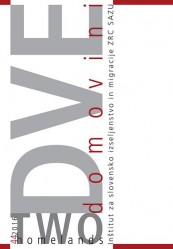Slovene Textbooks as an Agent of Ethnocentric and Racist Socialization: the Case of Elementary School Geography Textbooks
DOI:
https://doi.org/10.3986/dd.2016.2.11Keywords:
elementary school textbooks, geography, Eurocentrism, racism, stereotypesAbstract
The article demonstrates the main findings of critical discourse analysis of the sixteen elementary school geography textbooks regarding the discourse on the West and Europe, on the individual continents and the relations between them. The author states that a great majority of the textbooks discussed include linguistic strategies, content, mental schemas and illustrative material which lead to stereotypic, simplified, Eurocentric and racist conclusions about the non-European world and its inhabitants, migrants etc. The author states that several of the textbooks on the market for this subject do not assure the plurality of discourses and contents as a tool to achieve defined standards of knowledge.
Downloads
References
Apple, Michael W. (1992). Šola, učitelj in oblast. Ljubljana: Znanstveno in publicistično središče.
Bahar, Igor (2004). Geografija 6: Učbenik za pouk geografije v 6. razredu 9-letne OŠ. Ljubljana: Mladinska knjiga.
Carignan, Nicole, Sanders, Michael, Pourdavood, Roland G. (2005). Racism and Ethnocentrism: Social Representations of Preservice Teachers in the Context of Multi- and Intercultural Education. International Journal of Qualitative Methods 4/3, http://www.ualberta.ca/~iiqm/backissues/4_3/pdf/ Carignan.pdf (3. 2. 2015).
Društvo Afriški center (2010). Afrika v slovenskem šolskem sistemu, http://www.drustvo-dugs.si/dokumenti/Afrika_v_slovenskem_solskem_sistemu.pdf (3. 2. 2015).
Dijk, Teun A. van (1998). Ideology: A Multidisciplinary Approach. London–Thousand Oaks–New Delhi: Sage Publications.
Dijk, Teun A. van (2005). Critical Discourse Analysis. The Handbook of Discourse Analysis (ur. Deborah Schiffrin, Deborah Tannen, Heidi E. Hamilton), http://www.discourses.org /OldArticles/Critical%20 discourse%20analysis.pdf (14. 9. 2015).
Katalog učbenikov za osnovno šolo – geografija (2015), https://soca1.mss.edus.si/ Trubar/Javno/default.a (15. 9. 2015).
Kolenc Kolnik, Karmen, Korže Vovk, Ana, Otič, Marta, Senegačnik, Jurij (2000): Spoznavamo Afriko in novi svet: Geografija za 8. razred devetletne osnovne šole. Ljubljana: Založba Modrijan.
Kolenc Kolnik, Karmen (2004): Geografija za 6. razred. Ljubljana: DZS.
Kovač, Miha, Kovač Šebart, Mojca, Krek, Janez, Štefanc, Damijan, Vidmar, Tadej (2005). Učbeniki in družba znanja. Ljubljana: Pedagoška fakulteta in Znanstveni inštitut Filozofske fakultete.
Miklavc Pinterič, Simona, Popit, Sabina (2005): Geografija 7: Učbenik za 7. razred devetletne osnovne šole. Ljubljana: DZS.
Mastnak, Tomaž (1996). Mit Evrope in religija demokracije. Družboslovne razprave 21/12, 11–19.
Mavromataki, Maria (1997). Greek Mythology and Religion. Athens: Haitalis.
Novak, Franci, Otič. Marta, Vovk Korže, Ana (2001). Geografija za 8. razred. Ljubljana: DZS.
Novak, Franci (2003). Geografija Slovenije za 9. razred devetletke in 8. razred osemletne osnovne šole. Ljubljana: DZS.
Popit, Sabina, Resnik Planinc, Tatjana (2000). Življenje človeka na Zemlji: Učbenik za izbirni predmet človek in Zemlja v 8. razredu 9-letne osnovne šole. Ljubljana: Mladinska knjiga.
Račič, Jože, Večerič, Danica (2002). Geografija za osmi razred 8-letne osnovne šole in deveti razred 9-letne osnovne šole. Ljubljana: Mladinska knjiga.
Račič, Jože, Tomšič, Žarko (2005). Geografija 7: Učbenik za geografijo v sedmem razredu osnovne šole. Ljubljana: Mladinska knjiga.
Resnik Planinc, Tatjana, Bahar, Igor, Račič, Jože (2000). Geografija 8: Učbenik za geografijo v osmem razredu osnovne šole. Ljubljana: Mladinska knjiga.
Resnik Planinc, Tatjana, Bahar, Igor, Račič, Jože (2000). Geografija 8: Učbenik za geografijo v osmem razredu osnovne šole. Ljubljana: Mladinska knjiga.
Senegačnik, Jurij, Drobnjak, Borut (2000). Spoznavamo Evropo in Azijo: Geografija za 7. razred devetletne osnovne šole. Ljubljana: Modrijan.
Senegačnik, Jurij (2008). Moja prva geografija: Geografija za 6. razred osnovne šole. Ljubljana: Modrijan.
Senegačnik, Jurij (2009). Geografija Evrope in Azije: Učbenik za 7. razred osnovne šole. Ljubljana: Modrijan.
Šabec, Ksenija (2015). Reprezentacije neevropskega sveta v izobraževalnem sistemu: Učbeniki kot akter etnocentrične in rasistične socializacije. Dve domovini / Two Homelands 42, 127–140.
Učni načrt – Geografija – Program osnovna šola (2011). Ljubljana: Ministrstvo za šolstvo in šport Zavod RS za šolstvo, http://www.mizs.gov.si/fileadmin/mizs.gov.si/pageuploads/podrocje/os/prenovljeni_UN/ UN_geografija.pdf (15. 9. 2015).
Verdev, Helena (2004). Raziskujem Zemljo 6: Učbenik za geografijo v 6. razredu osnovne šole. Ljubljana: Rokus Klett.
Verdev, Helena (2009). Raziskujem Stari svet: Učbenik za geografijo v 7. razredu osnovne šole. Ljubljana: Rokus Klett.
Vezovnik, Andreja (2008). Kritična diskurzivna analiza v kontekstu sodobnih diskurzivnih teorij. Družboslovne razprave 24/57, 79–96.
Vrečer, Natalija (2012). Vključenost vsebin večkulturnega izobraževanja v učne načrte in učbenike za predmet geografija. Dve domovini / TwoHomelands 36, 47–57.
Wodak, Ruth, Meyer, Michael (2006). Methods of critical discourse analysis. London, Thousand Oaks, New Delhi: Sage.
Žmavc, Janja, Žagar, Igor Ž. (2011). Kako so Evropejci odkrili neznane dežele in se spoznali z novimi ljudstvi: Evropa v slovenskih osnovnošolskih učbenikih. Ljubljana: Pedagoški inštitut.
Downloads
Published
How to Cite
Issue
Section
License

This work is licensed under a Creative Commons Attribution-NonCommercial-NoDerivatives 4.0 International License.
Authors guarantee that the work is their own original creation and does not infringe any statutory or common-law copyright or any proprietary right of any third party. In case of claims by third parties, authors commit their self to defend the interests of the publisher, and shall cover any potential costs.
More in: Submission chapter





